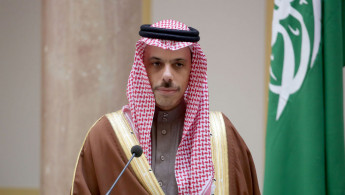Iran agreement does not mean 'all differences resolved': Saudi FM
Saudi Arabia's foreign minister says a move to restore diplomatic ties with Iran does not mean that all differences are resolved but was a sign of a mutual desire to settle them.
Faisal bin Farhan said in an interview with the Saudi-owned Al-Sharq Al-Awsat newspaper on Monday that the new agreement showed a desire "to resolve differences through communication and dialogue" in a bid to bolster regional security.
There has been controversy in the US over China's role in brokering the agreement, a country that is relatively new to Gulf diplomacy.
"This does not mean that an agreement has been reached to resolve all pending disputes between them," said bin Farhan.
"[The deal] served as evidence of our mutual desire to resolve [the differences] through communication and dialogue, through peaceful ways and diplomatic instruments."
The Saudi foreign minister said he was looking forward to meeting his Iranian counterpart soon.
"We are preparing to resume diplomatic relations between our countries within the next two months, and it's natural that we exchange visits in the future," Bin Farhan said.
"We in the kingdom hope to open a new chapter with Iran and to enhance the prospects of cooperation in a way that positively impacts the strengthening of security and stability, and the advancement of development and prosperity, not only in our two countries, but in the region as a whole."
Relations between the two countries have been troubled since the 1979 revolution in Iran, but broke down after Saudi Arabia's execution of Shia cleric Nimr Al-Nimr, in 2016 resulting in angry protesters targeting Riyadh's diplomatic missions in Iran.
Riyadh announced it would end relations with Tehran over the attacks and withdrew all diplomats from Iran.
Saudi Arabia and Iran announced on Friday a China-brokered deal to restore diplomatic ties and reopen embassies following a seven-year rift.
The Iran-Saudi agreement highlighted Beijing's role in shifting alliances and rivalries in the region, signaling a weakening of Washington's influence in the Middle East, particularly with its long-time ally Riyadh.
Republican Congressman Mike Turner said the Saudi-Iran deal was a "very troubling" development, and it reflected China's growing influence.
"They are absolutely emerging as a military threat to the United States. I think we need to respond and respond very strongly," Turner said in an interview with ABC channel on Sunday.




 Follow the Middle East's top stories in English at The New Arab on Google News
Follow the Middle East's top stories in English at The New Arab on Google News


